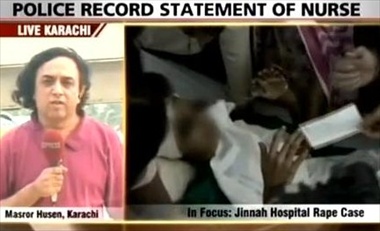
This detail of a screen shot from Pakistan's Express Tribune's report on a nurse's rape is just one example of how Pakistan's media can be intrusive. (Credit: "etribune," YouTube)
A Pakistani blogger wrote Aug 22 criticizing the Pakistani’s intrusive media coverage and insensitive treatment of victims.
The blogger, Jamal Ashiqain, highlighted several recent incidents where the media in Pakistan has shown, in his opinion, questionable ethics and irresponsibility, among them was the July 13 report of a 22-year-old trainee nurse was raped and either pushed out or jumped out of a window.
CathNews Asia reported that the nurse was found outside of a medical center’s doctors’ hostel after having been raped. The doctor, Abdul Jabbar Memon, was tried and found guilty of her rape and of throwing her out of the window afterward, according to Pakistan’s Daily Times. Several of the ensuing news reports showed images of the woman in her hospital bed.
While her face is blurred, video footage of a recent rape victim pushes media ethics. Also, some news organizations – including Asian Correspondent, Union of Catholic Asian News and CathNews Asia published the woman’s name.
Benedict wrote that “To name a rape victim is to guarantee that whenever somebody hears her name, that somebody will picture her in the act of being sexually tortured. To expose a rape victim to this without her consent is nothing short of punitive.”
The U.S. Poynter Institute’s Bob Steele wrote in 2002 about the proper treatment of rape victims’ information in the media. He called journalist Helen Benedict’s 1992 book “Virgin or Vamp: How the Press Covers Sex Crimes” as “one of the most thoughtful treatments of this issue.”The other sensationalized and inappropriately handled stories Ashigain mentioned also included the July 28 on a plane crash in Margalla, Islamabad killing all 150+ passengers and the the past month’s monsoon season’s floodings and the murder of two brothers in Sialkot (of which the video was broadcast on news channels).
The U.S. Society of Professional Journalists’ code of ethics advises journalists “minimize harm” to victims of such crimes. It includes:
- “Show compassion for those who may be affected adversely by news coverage. Use special sensitivity when dealing with children and inexperienced sources or subjects;
- “Be sensitive when seeking or using interviews or photographs of those affected by tragedy or grief;
- “Recognize that gathering and reporting information may cause harm or discomfort. Pursuit of the news is not a license for arrogance;
- “Recognize that private people have a greater right to control information about themselves than do public officials and others who seek power, influence or attention. Only an overriding public need can justify intrusion into anyone’s privacy.
- “Show good taste. Avoid pandering to lurid curiosity;
- “Be cautious about identifying juvenile suspects or victims of sex crimes;
- “Be judicious about naming criminal suspects before the formal filing of charges;
- “Balance a criminal suspect’s fair trial rights with the public’s right to be informed.”
Margalla Plane Crash
Asian Correspondent’s Sana Saleem wrote that TV reporting of the floods “reeked of sensationalism” and was “disgusting, unethical, shameful and downright insensitive.” In Saleem’s view, the TV stations reported unconfirmed and conflicting information: for example, one news station said there weren’t any survivors, while another claimed there at least five. Eventually, the truth that there weren’t any survivors came out, “leaving the families and relatives of the victims shaken and disappointed.”
Likewise, Dawn’s deputy editor Shyema Sajjad, wrote that the sensationalist stories make it difficult for the public to believe and trust the media. “We can not play with people’s hopes and emotions – how do you even expect a nation to trust you?” Dawn is a Pakistani national newspaper.
Sajjad wrote that the “Pakistani media crashed” along with the plane that day because of its insensitivity and intrusiveness.
iMediaEthics wrote about Pakistan’s media environment in July, when journalist Babar Ayaz called for an activated press council in the country.






